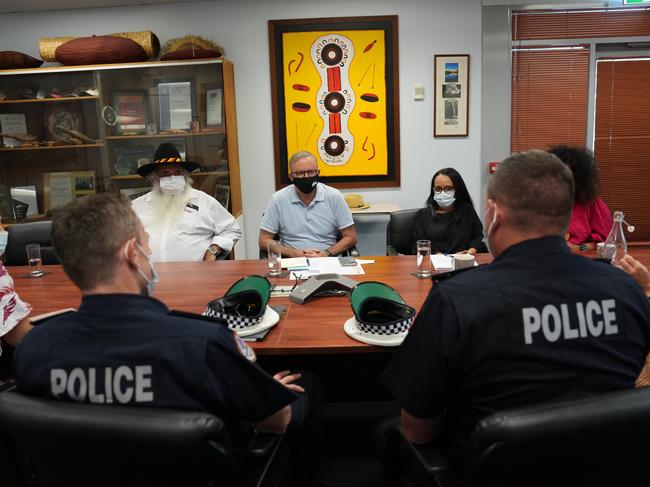Aboriginal health service calls for Alice Springs alcohol restrictions, community grog bans to be extended
A year on from urgent alcohol restrictions being introduced in Alice Springs, the largest Aboriginal health organisation in Central Australia says they’re working.
Alice Springs
Don't miss out on the headlines from Alice Springs. Followed categories will be added to My News.
The largest Aboriginal health organisation in Central Australia has praised the government’s alcohol restrictions in Alice Springs a year after the snap measures were introduced to combat soaring crime.
Central Australian Aboriginal Congress gave its strong support for the Northern Territory government’s “evidence-based restrictions”, with data showing a drop in alcohol sales, fewer hospital presentations, and lower crime rates after the bans.
Urgent restrictions on the sale of alcohol in Alice Springs were introduced in January last year, amid an emergency visit by Prime Minister Anthony Albanese as pressure to address crime reached boiling point.

A month later this was followed by laws reverting Aboriginal town camps and communities to dry zones, different from Intervention-era bans in that communities could develop their own alcohol management plans if they decided to opt out of the restrictions.
So far just one community has submitted a plan, which is yet to be approved.
Congress chief executive Donna Ah Chee said data showed “how effective the government’s action has been in keeping the people of Alice Springs safe”.
“We all remember the wave of alcohol-related crime and violence that affected our town in 2022. At that time, Congress and many other Alice Springs residents and organisations urged the Northern Territory government to act, and fortunately they listened to us.”
Alice Springs Hospital saw alcohol-related presentations halve immediately following the bans, and alcohol-related assaults in the town dropped 42 per cent.
Alcohol sales were down 25 per cent in July through September last year, compared with the same period in 2022.
“A year on, we can definitely rule out that the reductions in harm are the result of seasonal variations. These effects are real, and they contribute to the safety of every person in Alice Springs,” Ms Ah Chee said.
Look prior to the lapse of Stronger Futures – a moment policymakers had 10 years to prepare for – and the picture is less optimistic, with property offences and domestic violence assaults now higher than they were before July 2022.
The CLP has indicated it would consider relaxing alcohol restrictions if they won this year’s election, particularly those affecting businesses.
“What we need to do upon coming to government is an assessment of what restrictions are working and which ones aren’t, and slowly taper those back when we have programs in place to fill the gaps,” Opposition Leader Lia Finocchiaro said.
“There are many ways in which you might scale back restrictions and move forward with policy of alcohol treatment to deal with that issue of demand.”

Alcohol Minister Brent Potter said misuse of alcohol and its consequences were “complex issues”.
“However we know the best outcomes are achieved when government, community and industry work together,” he said.
“Our government will always continue to develop community driven projects, including alternative avenues, which deliver local solutions, progress Alcohol Management Plans and reduce alcohol related harm.”
Ms Ah Chee said: “Alcohol bans alone will not solve all the social issues in Central Australia, including the complex issues that lead to young people being on the streets.”
“We need sustained action to address intergenerational trauma, poverty, inequality, poor education, and discrimination.
“But in the meantime, we will need to continue the alcohol restrictions to keep Alice Springs residents, families, visitors and businesses safe.”





